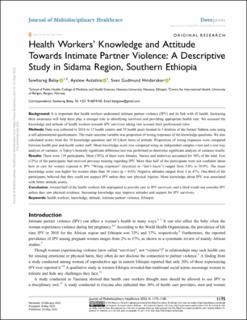| dc.contributor.author | Belay, Sewhareg | |
| dc.contributor.author | Astatkie, Ayalew | |
| dc.contributor.author | Hinderaker, Sven Gudmund | |
| dc.date.accessioned | 2022-09-16T06:50:51Z | |
| dc.date.available | 2022-09-16T06:50:51Z | |
| dc.date.created | 2022-09-09T12:22:53Z | |
| dc.date.issued | 2022 | |
| dc.identifier.issn | 1178-2390 | |
| dc.identifier.uri | https://hdl.handle.net/11250/3018272 | |
| dc.description.abstract | Background: It is important that health workers understand intimate partner violence (IPV) and its link with ill health. Increasing their awareness will help them play a stronger role in identifying survivors and providing appropriate health care. We assessed the knowledge and attitude of health workers towards IPV survivors taking into account their professional roles.
Methods: Data was collected in 2018 in 12 health centers and 55 health posts located in 3 districts of the former Sidama zone using a self-administered questionnaire. The main outcome variable was proportion of wrong responses of the knowledge questions. We also calculated scores from the 10 knowledge questions and 10 Likert items of attitude. Proportions of wrong responses were compared between health post and health center staff. Mean knowledge score was compared using an independent samples t-test and a one-way analysis of variance. A Tukey’s honestly significant difference test was performed to determine significant analysis of variance results.
Results: There were 139 participants. Most (78%) of them were females. Nurses and midwives accounted for 54% of the total. Few (13%) of the participants had received previous training regarding IPV. More than half of the participants were not confident about how to care for women exposed to IPV. “Wrong responses” (incorrect or “don’t know”) ranged from 5.8% to 30.9%. The mean knowledge score was higher for women older than 30 years (p = 0.03). Negative attitudes ranged from 4 to 47%. One-third of the participants believed that they could not suspect IPV unless they saw physical injuries. More knowledge about IPV was associated with better attitude scores.
Conclusion: Around half of the health workers felt unprepared to provide care to IPV survivors, and a third would not consider IPV unless they saw physical evidence. Increasing knowledge may improve attitudes and support for IPV survivors. | en_US |
| dc.language.iso | eng | en_US |
| dc.publisher | Dove Medical Press | en_US |
| dc.rights | Navngivelse-Ikkekommersiell 4.0 Internasjonal | * |
| dc.rights.uri | http://creativecommons.org/licenses/by-nc/4.0/deed.no | * |
| dc.title | Health Workers’ Knowledge and Attitude Towards Intimate Partner Violence: A Descriptive Study in Sidama Region, Southern Ethiopia | en_US |
| dc.type | Journal article | en_US |
| dc.type | Peer reviewed | en_US |
| dc.description.version | publishedVersion | en_US |
| dc.rights.holder | Copyright 2022 Belay et al. | en_US |
| cristin.ispublished | true | |
| cristin.fulltext | original | |
| cristin.qualitycode | 1 | |
| dc.identifier.doi | 10.2147/JMDH.S361000 | |
| dc.identifier.cristin | 2050287 | |
| dc.source.journal | Journal of Multidisciplinary Healthcare | en_US |
| dc.source.pagenumber | 1175-1185 | en_US |
| dc.identifier.citation | Journal of Multidisciplinary Healthcare. 2022, 15, 1175-1185. | en_US |
| dc.source.volume | 15 | en_US |

